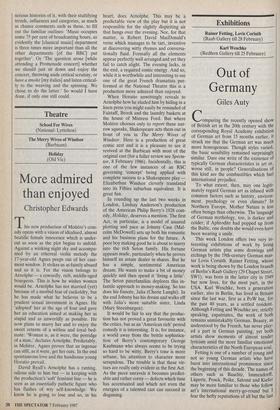Theatre
School For Wives (National: Lyttelton) The Merry Wives of Windsor (Barbican) Holiday (Old Vic)
More admired than enjoyed
Christopher Edwards
This new production of Moli6re's com- edy opens with a vision of idealised, almost beatific female innocence which is under- cut as soon as the plot begins to unfold. Against a winking night sky and accompa- nied by an ethereal violin melody the 17-year-old Agnes peeps out of her case- ment window. It strikes us as faintly absurd and so it is. For the vision belongs to Arnolphe — a cowardly, rich, middle-aged bourgeois. This is how he wishes women would be. Arnolphe has not married (yet) because of a morbid fear of cuckoldry, but he has made what he believes to be a prudent sexual investment in Agnes. He `adopted' her at the age of four and gave her an education aimed at making her as stupid and as unworldly as possible. He now plans to marry her and to enjoy the sweet returns of a witless and loyal bed- mate: 'Woman is, as it were, the porridge of a man,' declares Arnolphe. Predictably, in Moliere, Agnes proves that an ingenue can still, as it were, get her oats. In the end spontaneous love and the handsome young Horatio prevail.
David Ryall's Arnolphe has a ranting, odious side to him but — in keeping with the production's 'soft' feminist line — he is seen as an essentially pathetic figure who has flashes of wry self-knowledge. We know he is going to lose and so, in his heart, does Arnolphe. This may be a predictable view of the play but it is not responsible for the slightly dispiriting air that hangs over the evening. Nor, for that matter, is Robert David MacDonald's verse which manages to be tart, inventive at discovering witty rhymes and conversa- tionally fluid. Formally all the elements appear perfectly well arranged and yet they fail to catch alight. The evening lacks, in the end, a required comic energy. And so, while it is worthwhile and interesting to see one of the great French dramatists per- formed at the National Theatre this is a production more admired than enjoyed.
When Horatio unwittingly reveals to Arnolphe how he eluded him by hiding in a linen press you might easily be reminded of Falstaff, Brook and the laundry baskets at the house of Mistress Ford. But where Moliere chooses only to report these nar- row squeaks, Shakespeare acts them out in front of you in The Merry Wives of Windsor. Here is a production of great comic zest and it is a pleasure to see it revived at the Barbican with most of the original cast (for a fuller review see Specta- tor, 8 February 1986). Incidentally, this is one of the few instances of an RSC governing 'concept' being applied with complete success to a Shakespeare play Elizabethan Windsor cleverly translated into its Fifties suburban equivalent. It is great fun.
In rounding up the last two weeks in London, Lindsay Anderson's production of the American Philip Berry's 1928 com- edy, Holiday, deserves a mention. The first Act, in particular, is a model of assured plotting and pace as Johnny Case (Mal- colm McDowell) sets up both his romantic and his business plans for the future. A poor boy making good he is about to marry into the rich Seton family. His fortune appears made, particularly when he proves himself an astute dealer in shares. But he has a simple, sentimental American dream. He wants to make a bit of money quickly and then spend it 'living a little'. The Seton paterfamilias deplores this in- fantile approach to money-making. So too does his fiancée, Julia (Cherie Lunghi). In the end Johnny has his dream and walks off with Julia's more suitable sister, Linda (Mary Steenburgen).
It would be fair to say that the produc- tion has not proved a great favourite with the critics, but as an 'American rich' period comedy it is interesting. It is, for instance, a world away from the brittle sophistica- tion of Berry's contemporary George Kaufmann who always seems to be trying so hard to be witty. Berry's tone is more urbane, his attention to character more scrupulous. The trouble is that these vir- tues are really only evident in the first Act. As the piece unravels it becomes predict- able and rather corny — defects which time has accentuated and which not even the energies of a talented cast can succeed in disguising.


















































 Previous page
Previous page